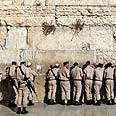
Wailing, fasting and the wearing of ashes, alongside socializing, communing and catching up with old friends in a fun outdoor atmosphere. That is the dichotomy of Tisha B’Av in modern day Jerusalem. On the one hand a somber mood, but on the other hand, a paradoxical sense of joviality fills the warm summer night.
It makes sense that some level of happiness is in the air, because after all, we are bewailing the destruction of Jerusalem in a big, beautiful and built Jerusalem. This contrast is highlighted in the Jewish liturgy on the 9th of Av when we say the “Nachem” prayer referring to mournful, destroyed and desolate Jerusalem. However, we say that prayer in one of the hundreds of beautiful Synagogues in the city, or at the courtyard of Jerusalem’s city hall, or at the Western Wall with thousands of our fellow Jewish Israeli citizens who have travelled from other thriving Israeli cities on the paved roads of the Jewish state to pray for the future of Jerusalem.
Indeed, a major change has taken place in Jewish life, and while we keep the same rites as we have kept for 2,000 years, our reality is vastly different. To understand the change, here is a parable: Two women are in a room and both are single. One’s husband has just died, while the other is engaged to be married - both are indeed single, but they are in totally different states of mind.
So, too, is the Jewish nation: We have mourned for the last two millennia because we were forcibly dispossessed of our land, our capital was sacked, our Temple destroyed and it was as though our husband was murdered. But now with half the Jewish people in the land of Israel and Jerusalem standing in earthly beauty, we are engaged to be married and await the next stage of fulfillment. Our mourning now is the yearning for a final redemption - like a bride waiting for the wedding canopy, we impatiently await the completion of this great process.
Yet so many Jews deny the obvious reality. Almost like a mantra, they tell you that nothing has changed, that we are still in exile, that there is no difference between living in Israel and living in the Diaspora. Our own people somehow don’t see the transformation that has opened the doors for our nation to return to lost tradition, speak our national language, fight in a Jewish army, and create a culturally Jewish state on our ancestral land. One gets the impression that some prefer not to see it, lest it break their romance with other dreams, namely, the American Dream.
Kosher hot dogs
Recently, I caught an article in the Jewish Journal and it was titled: “They just want kosher Dodger Dogs.” The article went on to say that a consortium of six “accomplished professionals” who are also “season ticket holders” are working to remedy the lack of kosher hot dogs at Dodger Stadium in LA. “We are really just a group of people who feel very strongly that the second-largest Jewish community in the country should have the ability to eat a Jewish hot dog at a ballgame...” said a member of the committee, an attorney.
Seriously? Is this what grown men spend their time on? The Jewish people are engaged in the most exciting project in 2,000 years - building a Jewish State. We face enormous challenges to build up, educate, and protect our people, and all this is happening while wealthy season-ticket Kosher-eating Jews are fighting for kosher hot dogs in Dodger stadium? Are we so comfortable with the status quo that Jewish leaders can spend their time on nonsense?
Eight years ago Rabbi Shlomo Riskin wrote:
“The formative and formidable challenge of Tisha B’Av is the word Eicha, the first word of the Scroll of Lamentations, which means Wherefore (wherefore is the Sacred City alone and desolate,) our challenging question to G-d after the destruction.”
“But the Hebrew letters Eicha also spell Ayeka, “where are you”, i.e. G-d’s challenge to us: where are you in these fateful times fraught with possibility for redemption?”
Yes, we live in fateful times, fraught with possibility for redemption, and we are being asked by Jewish history to engage. But while there is much to do in our time, and lots of power and resources to do it, it is also an era of unprecedented comfort and convenience. Today, we live in a built Jerusalem and we have the leisure to fight for kosher hotdogs in LA and it’s almost as though life is perfect and we have nothing to worry about.
Now more than ever we need a reminder that there is a lot of work yet to be done in the Jewish home and the 9th of Av is a perfect opportunity to get us back on track for the mission of our generation. The Jewish state needs our input and energy, our money and our sweat. We have to put resources into education, security, infrastructure, health and finance. We have to take our nation and our country to the next stage.
And that is why we still cry on the 9th of Av in today’s beautiful Jerusalem. We mourn because we are so close and yet so far. Yes, Jerusalem is united, but our nation is divided, physically and spiritually. We are still so often under verbal and physical attack while many Jews continue to marry out and others don’t know or don’t care about the beauty of our heritage. We weep because with all our success, there is still so much pain and loss.
Yet, I do not resent the merry atmosphere on the 9th of Av in Jerusalem. There is a confidence in the air that the Jewish story is victorious and that we are approaching a great day. Our much awaited bride is already at the wedding canopy.
Jerusalem is waiting.















